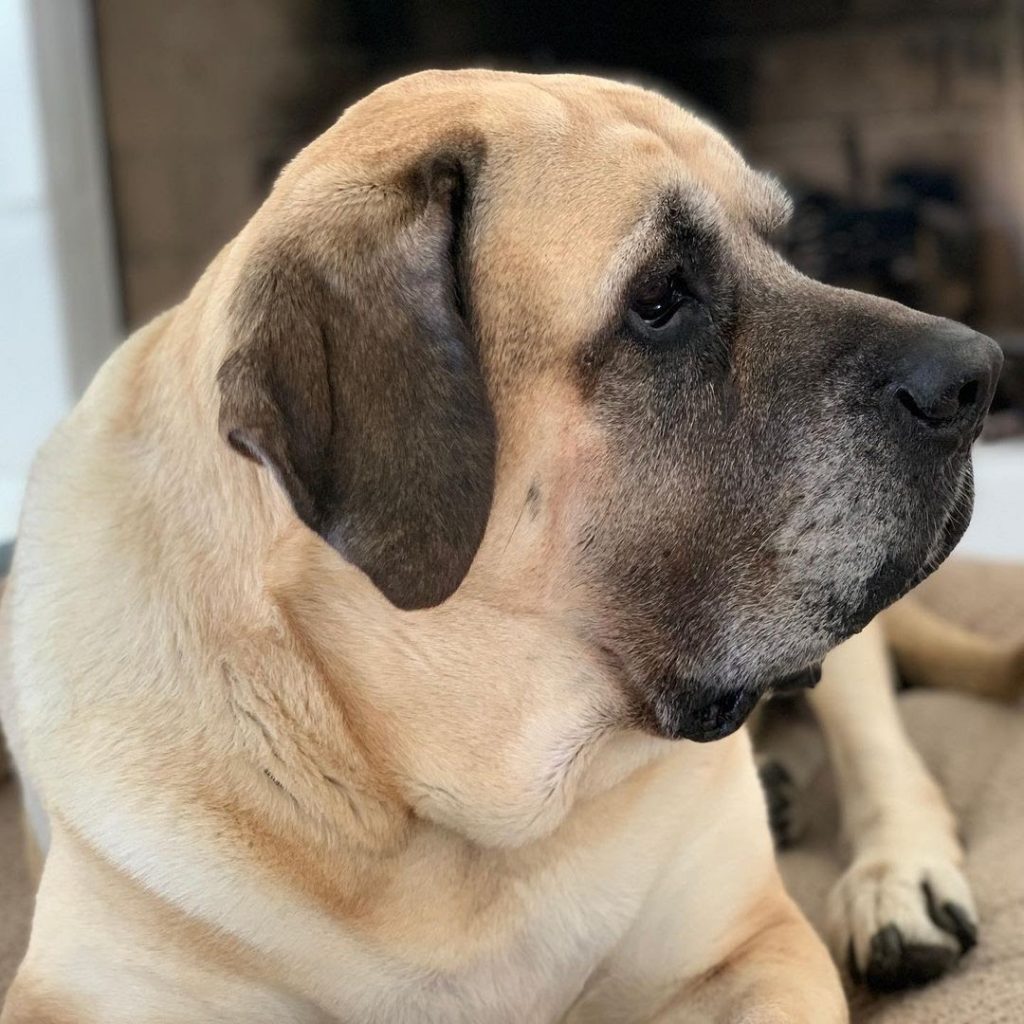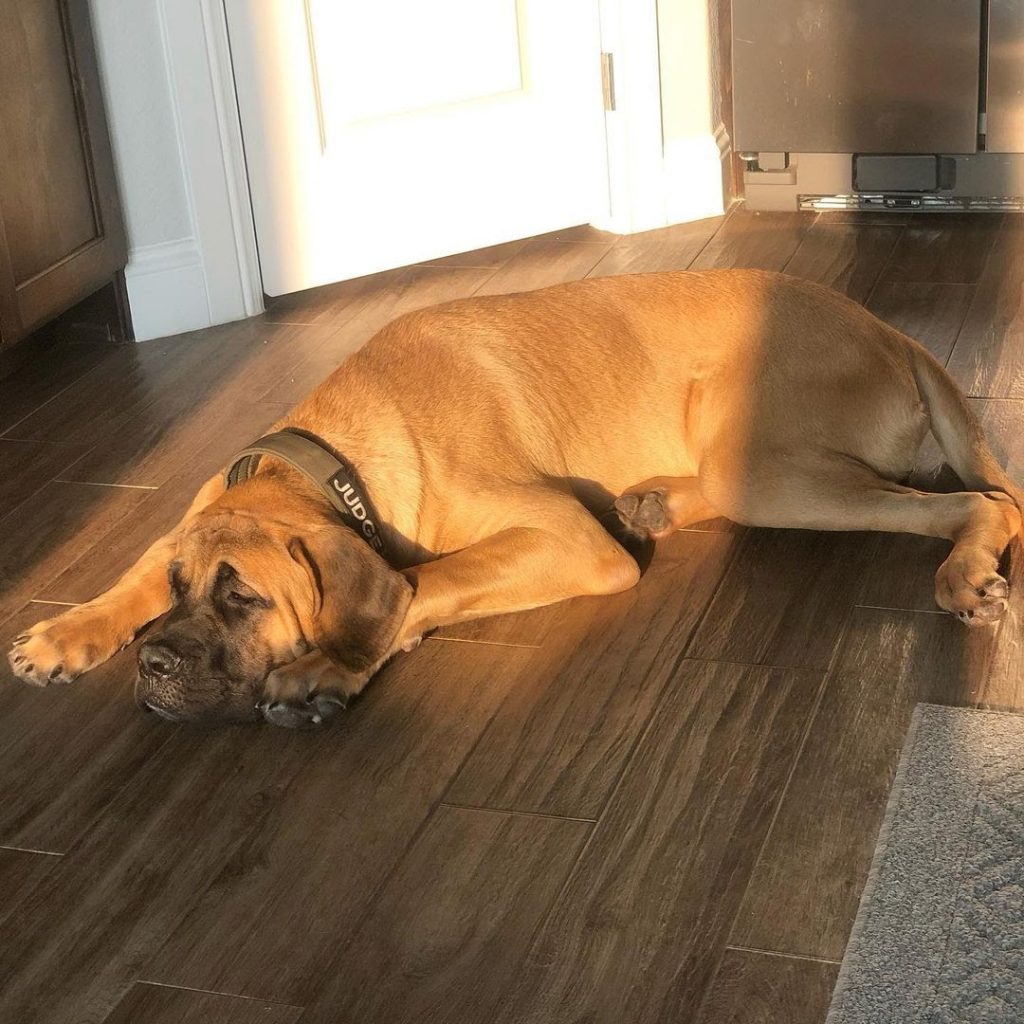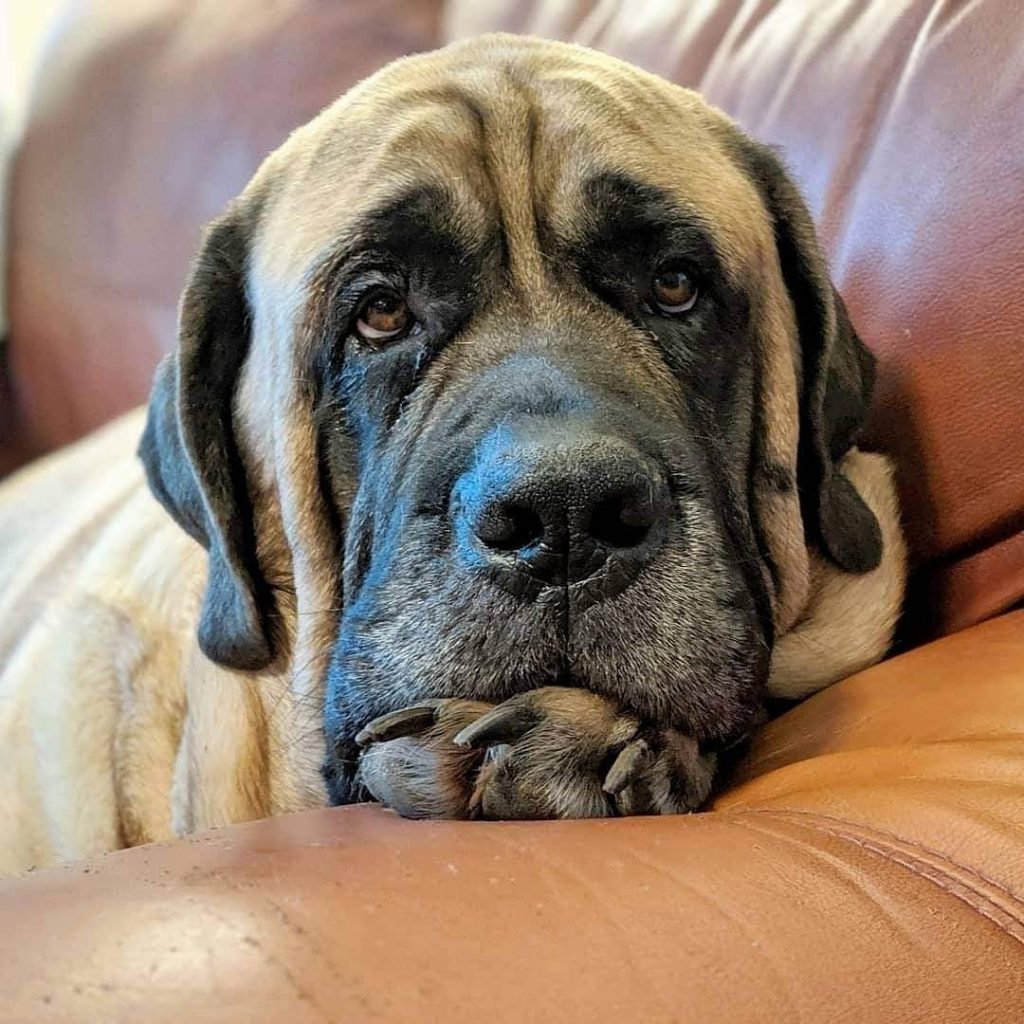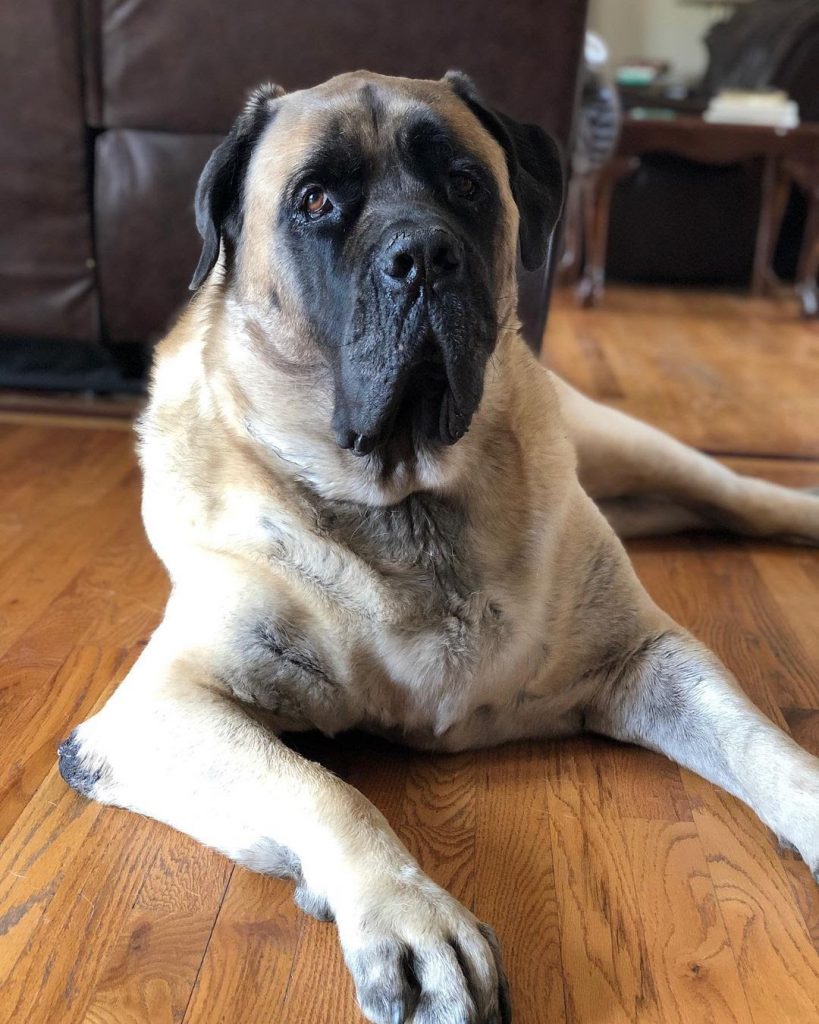How Long Can an English Mastiff Be Left Alone? Facts & FAQs
Upon bringing an English Mastiff home, he instantly becomes a huge part of the family. As much as we want to spend a lot of time watching him grow, the demand for work and other activities needs to be tended to and that means temporary separation from our buddy.


Generally, you can leave your English Mastiff alone for a maximum of four hours. This will vary individually since each dog has different levels of social needs. Some have also been trained to cope with being alone at home while others still struggle to spend the day all by themselves.
With lots of daily responsibilities we need to deal with, it is okay to leave our dog at home. But how long is too long? That and other more questions will be answered by this article.
Table of Contents
Does the English Mastiff Ever Feel Lonely?
Yes, he does. Just like any other dog breed, this English Mastiff craves company and interaction. He’s a descendant of the great wolf and along with this fact is his pack instinct. He does well if there’s a second dog in the family or a cat who’s friendly enough to play with him if you have to go out often for work or other errands.
One thing to also know about this Mastiff breed is that he’s extremely sensitive despite his tough history. He can’t stand being ignored or treated as a nobody. Just like humans, he’s extremely social, and being deprived of an opportunity to interact with others will lead to serious problems in the future.
What Happens if I Leave Him Alone for Too Long?
If he’s been feeling bored frequently and nothing is done to address this, signs and symptoms of anxiety will start showing.
Ever heard of dogs going destructive mode when they are left alone? That could eventually become a concern, especially if the habit gets worse and uncontrollable. You can take this as a cry for help and such an event should never be dismissed.


Becoming bored and alone for extreme lengths of time can upset your English Mastiff. Know that this dog will also know how it feels to miss someone dearly, especially those with whom he’s attached the most. He can’t do much as a dog since there are no tasks left for him to do. All he can ever execute is to stare blankly on the walls of the house, eat, sleep, and repeat.
This kind of lifestyle can be detrimental mentally and physically for your English Mastiff buddy. Usually, this can result in the following:
- Stress
- Depression
- Unresponsiveness
- Lots of sleep
- Overgrooming (It could result in sore patches)
- Barking and howling for no reason
- Chewing on furniture
When these are exhibited by your dog, you should get in touch with a dog training coach or an animal behaviorist so you can understand much deeper what prompts your dog to act this way. You’ll also get to see how to solve these problematic behaviors and avoid them from manifesting again in the future.
How Long Can English Mastiffs Be Alone?


Aside from the general rule of ensuring your dog gets interaction every four hours, know that age will alter this standard. Puppies, adolescents, adults, and old English Mastiffs will have varying needs for attention. Some will need socialization every hour while others can withstand being alone for four hours.
To have a better guide on how often owners should spend time with their Mastiff pets, below is a table showing the different stages of dogs with their corresponding need for social interaction by frequency in hours.
| English Mastiff Age | Maximum Period an English Mastiff Can Be Left Alone During the Day |
| Under 10 weeks | Should be visited every hour. |
| 10 to 12 weeks | Needs to be checked every two hours. |
| 3 months | Gradually build the time to 3 hours. |
| 4 months | Maintain it for 3 hours. |
| 5 months | Check your dog every once in a while for 3 hours. |
| 6 months | Gradually build it to 4 hours. |
| Adolescent dog | Needs to be checked every 4 hours. |
| Adult dog | Can be left alone for up to 4 to 6 hours. |
| Geriatric dog | Needs to be revisited every 2 to 6 hours. |
Realistically, this ends up becoming successful only when you have the support of your family, friends, and professionals who specialize in dogs. Although you can get a second pet, nothing is much better than human interaction for your English Mastiff.
7 Tips to Consider to Make Your Dog Get Preoccupied
There are a plethora of solutions that could help resolve your concern regarding your dog’s need for socialization, especially when you know that your schedule is always loaded. Remember, considering all the options gets more crucial when your buddy is still a puppy. This is the stage when all fundamental puppy lessons should be acquired by your English Mastiff for valuable lifelong benefits.
Here are some tips to keep your dog busy while you’re gone for work:
Ask Your Neighbor or Friend to Look After Your Dog
Asking your neighbor or even a close friend to come over to your place and watch over your English Mastiff is a great way of preventing your dog from getting bored. Ensure that he is familiar with the person and that both of them are comfortable with each other.
You can leave certain instructions regarding when to feed him and when to take the dog out to urinate.
Bring Your Mastiff to the Doggie Daycare
Enrolling your dog in a local doggie daycare will quench his thirst for interaction. There, he’ll be able to meet the other pooches and strengthen his social skills! He’ll have a great time and if he’s brought in regularly, he’ll even look forward to seeing his mates.
Just remember that puppies who are below 12 weeks of age should not be brought to this place too early. Make sure he’s completely vaccinated first so he won’t be prone to transmittable diseases which he might get from other dogs.
Moreover, choose your daycare carefully. Opt for the clean one, organized with qualified staff who knows how to handle dog interactions.
Hire a Dog Sitter
Hiring a dog sitter is more ideal when you have to be away for a few days. Aside from the fact that a dog sitter knows exactly what the job requires, you can also depend on him or her on several other things during your absence. Aside from the advantage that your dog gets to stay at home with the pet sitter with no great changes, several other more benefits come into mind:
- Less exposure to contagious diseases when compared to boarding facilities.
- A pet sitter can give his/her entire attention to your English Mastiff, unlike boarding facilities where other more dogs are present.
- There are little to no changes when you hire a pet sitter. You provide your own house rules instead of subjecting your dog to the boarding facility’s regulations like feeding schedules.
- You’ll receive more updates from your pet sitter. It could be via texts, emails, or videos to let you see how your English Mastiff is doing.
- Your dog sitter can do minimal household chores when needed for an added fee. With his or her presence, theft can also be avoided.
Hire a Dog Walker
If all of a sudden, there is a change in your day’s schedule, you can just hire a dog walker. Being stuck at lunchtime with the uncertainty if you can still rush and take your dog out for a potty or his exercise can make you feel worried.
Thankfully, dog walkers are available to do this task for you. They’ll be able to ensure your dog gets enough exercise for the day and interaction he’d need from a human being.
Come Home for Lunch
If your dog is used to being left alone for a maximum of four hours with a few tasks to get him busy with, coming home for lunch to reinforce his good behavior is ideal. You’d be able to check on your English Mastiff and see if everything goes well inside your home or apartment.
Work From Home
These days, working remotely has become a fashion. If it’s allowed and more convenient, bringing your work to your home will be something your English Mastiff will highly appreciate. With you around, he’ll be able to have interactions with you more often and see you around more frequently.
Bring Your Mastiff to Work With You
You have to ask permission from someone in authority before you put the seatbelt on over your English Mastiff. If you have the go signal, not only would you be able to save your dog from developing separation anxiety but as well as light up the mood in your office. Other workers might also love having your dog around as long as he’s behaved and friendly to others.
Can I Train Him to Be Alone?


No doubt, yes, you can train your English Mastiff alone. However, it is still recommended never to leave him all by himself for too long. Given that he’s a social creature, it would be deemed cruel if he doesn’t receive this particular need of his.
There are certain pieces of training you could incorporate into your pet’s day-to-day life. Ideally, starting during his puppyhood will make it easier for him to absorb the sessions and develop routine habits. Anyhow, here are a few drills you can teach him:
- Crate Training. Providing your English Mastiff his space and associating it as his safe zone will calm him down and prevent him from showing signs of being uncomfortable with your absence.
- Proactive Exposure Training. Expose your English Mastiff puppy to different kinds of experiences early on. One study has found that dogs under 10 months who have had insufficient socialization are more likely to develop separation anxiety.
- Keep your arrivals and departures low-key. Do not fawn over your dog every time you have to leave or arrive at home. Act as if nothing happened after being gone for a few hours and show them affection after some time.
- Keep him physically and mentally stimulated. You can purchase interactive toys or brain games for your English Mastiff. If you’re out and about, he’ll have something to play on instead of just sleeping or doing nothing.
In owning a Mastiff, or even if it’s a different dog breed, certain responsibilities are in your hands. That includes making sure your pet is continuously receiving his needs not just in food but as well as in terms of his social requirements. If you are a prospective owner, ask yourself these two questions:
- Do I have time for a pet?
- Can I afford to own an English Mastiff?
If you cannot guarantee that you’ll be there with your dog sufficiently or have the capacity for others to do it for you, then you might reconsider your plan of getting a dog.
